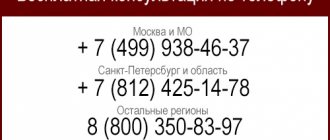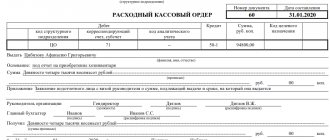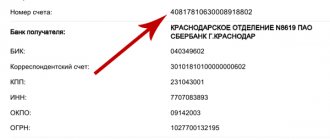Dual moment
When registering with the tax authorities, any person is assigned an INN - an individual taxpayer number. This code allows you to find out the history of receipts and payments in relation to an individual throughout his life. The number is indicated in the special certificate. As a rule, it is issued during registration. Also see “What is a TIN and where to get it.”
According to the law, an employer can request a TIN from an employee when applying for a job. However, in the Labor Code, the TIN is not included in the list of information required to be provided to the personnel department during employment. The employee has the right to legally refuse to provide the TIN to the employer.
Changes and additions are regularly made to tax legislation. Often, letters and recommendations appear, after the publication of which accountants and tax specialists have a number of questions. And sometimes incorrect filling out of documents entails fines or the need to re-submit reports.
Thus, at the end of autumn 2015, tax authorities published a letter that discussed changes when submitting reports in form 2-NDFL. It was assumed that the TIN in the 2-NDFL certificate will be mandatory in 2016 . The explanations stated that when filling out the document, it is necessary to enter the TIN in 2-NDFL for an individual. Otherwise, reporting is not possible. A certificate without the specified TIN will not pass format and logical control and will be returned by the tax inspector.
Tax agents were faced with an acute question: what to do if the employee simply does not have a TIN or it is unknown? Thus, in 2-NDFL for 2021, the mandatory TIN was only at the beginning of the year. Now this rule does not apply. Also note: “PFR divisions are required to accept SZV-M without indicating the TIN.”
What are the consequences of submitting a 2-NDFL certificate to the tax authority without indicating the individual’s TIN?
Home — Consultations
Commentary to the Letter of the Ministry of Finance of Russia dated April 18, 2021 N 03-04-06/22325
All employers are required to annually submit certificates to their tax office in form 2-NDFL (Clause 2 of Article 230 of the Tax Code). This form, the procedure for filling it out and the electronic format were approved by Order of the Federal Tax Service dated October 30, 2015 N ММВ-7-11/ [email protected]
Section IV of the Procedure for filling out the 2-NDFL certificate determines that in the “TIN in the Russian Federation” field the identification number of the taxpayer - an individual, confirming the registration of this individual with the tax authority of the Russian Federation. If the taxpayer does not have a TIN, this detail is not filled in.
Not so long ago, if it turned out that the individual’s TIN was incorrectly indicated in the 2-NDFL certificate, the organization could get off with what is called a small loss. It was possible to simply issue a new certificate indicating the correct TIN of the taxpayer. When completing it, it was necessary to indicate the number of the previously submitted certificate and the new date for drawing up the certificate (see Letter of the Federal Tax Service of Russia for Moscow dated March 18, 2011 N 20-14/3/ [email protected] ).
As of January 1, 2021, the situation has changed dramatically. Law of May 2, 2015 N 113-FZ introduced Art. 126.1, which provides for liability for the submission by a tax agent to the tax authority of documents containing false information. Such “pleasure” now costs 500 rubles. in the form of a fine for each submitted document containing false information. And the regulatory authorities regard the indication of an incorrect TIN as precisely the presentation of false information (see Letters of the Federal Tax Service dated February 12, 2021 N BS-4-11/ [email protected] , dated February 11, 2021 N BS-4-11/ [email protected] , etc.).
A big commotion in this area was caused by the Letter of the Federal Tax Service of November 23, 2015 N 11-2-06/ [email protected] It instructed the tax inspectorates to set up programs for accepting 2-NDFL certificates so that reporting without indicating the TIN from tax agents in general was not accepted. Fortunately, subsequently, in the Letter of the Federal Tax Service dated January 27, 2021 N BS-4-11 / [email protected] , the tax authorities explained that they had established additional rules for format and logical control over the content of details in relation to an individual recipient of income, including checking for the presence of mandatory filling in the field “TIN in the Russian Federation” with the requisite “Citizenship (country code)” equal to “643”. The result of this control is the formation of a protocol for receiving information about the income of individuals with a message type to the tax agent of the form “Warning. The TIN for a Russian citizen has not been filled in.” In this case, information about the income of individuals (in the absence of other violations of format-logical control) is considered to have passed format-logical control and is subject to acceptance (see also Letters of the Federal Tax Service of February 2, 2021 No. BS-3-11 / [email protected] , dated February 2, 2021 N BS-3-11/ [email protected] , etc.).
Thus, certificates in form 2-NDFL with an empty field “TIN in the Russian Federation” will be accepted. However, the question remains open as to whether the agent will be held accountable under Art. 126.1 of the Code, if this field is left blank?
The Ministry of Finance in Letter dated April 18, 2021 N 03-04-06/22325 indicated that the submission to the tax authority of information on the income of individuals without indicating the individual’s TIN due to its absence, which has passed format control, does not constitute an offense established by Art. 126.1 of the Code. However, a reservation is made here that the tax agent is obliged to take all possible measures to identify the taxpayer who received income from it, including sending a request to the tax authority for a taxpayer identification number.
It is important to note here that the regulatory authorities, noting that the 2-NDFL certificate will be accepted even with the empty “TIN in the Russian Federation” field, do not say that you need to tell them why this field was not filled in. At the same time, given the duty of the tax agent to take all possible measures to identify the taxpayer, it seems that the tax agent should not sit idly by. And at a minimum, it is necessary to collect documents confirming that he tried to obtain an individual’s TIN, so that the certificates reflect complete and reliable information. Simply contacting the Federal Tax Service “Find out your TIN” service in this case will not be sufficient. Where are the guarantees that the service will not fail? What if the service displays a message stating that the TIN of this individual was not found, etc.? Therefore, the best option is to request information about the TIN directly from the tax authority. In any case, if there is no data in the Federal Tax Service database, the TIN field should be left blank.
In conclusion, let us remind you that a tax agent has a chance to avoid liability for providing false information to tax authorities. In accordance with paragraph 2 of Art. 126.1 of the Code, to do this, you need to correct the error and submit a “clarification” before the moment when the tax agent learned that the tax authority discovered the inaccuracy of the information contained in the documents submitted to it.
July 2021
Personal income tax, Tax liability, Tax reporting
Consultations on the topic:
We submit a declaration and pay personal income tax when selling a land plot
Providing a personal income tax deduction
Taxation of expenses for transporting employees to and from work
Resident – non-resident for personal income tax purposes
How to reflect payments under a GPC agreement in 6-NDFL
2021 Clarifications
At the beginning of February 2021, the Federal Tax Service published a letter clarifying the issue. According to the document, in the absence of other shortcomings and inaccuracies, inspectors are required to accept reports in Form 2-NDFL without the employee’s TIN.
As a result, tax agents can submit 2-NDFL certificates without a TIN. Without fear that the documents will not be accepted by the tax authorities. When asked whether a TIN is required in the 2-NDFL certificate , experts answer negatively.
Is it possible to submit 2-NDFL without a TIN in 2021?
To resolve this situation, the Federal Tax Service of the Russian Federation issued a new letter dated January 27, 2021, where it clearly explained the rules that all inspections will adhere to when accepting certificates:
- The TIN is indicated only if the employee provides a document;
- if the employer does not have the document, the field may remain empty, and such a certificate will undergo formal and logical control in the Federal Tax Service admission program;
- the transmitting party will receive a warning that not all information is provided, but the certificate will be accepted.
Thus, starting from 2021, the TIN is not required in 2NDFL certificates.
Is it possible to find out the employee’s tax identification number?
Let's say some accountants decided to play it safe and enter the TIN in the report. However, not every employee provides information when applying for employment, and you have to look for this information yourself.
Modern systems allow you to find out your TIN without leaving the office. To do this, just use a special application on the official website of the Federal Tax Service. To find out the TIN, you will need to enter the taxpayer’s last name, first name and patronymic, as well as his date of birth and passport details.
It is important to note that incorrect indication of the TIN for filing 2-NDFL threatens the tax agent with a fine of 500 rubles. Therefore, submitting reports with an empty field will help avoid punishment from tax officials. Also see “If the employee has not provided a TIN, you should request it from the tax authority.”
Rules of law
The assignment of an individual number to any taxpayer is legally established by the Tax Code, Article 84, paragraph 7.
In order to receive it, you need to bring to the inspection an application for assignment of a TIN, in which you indicate:
- last name, first name and patronymic;
- floor;
- full name of your place of birth;
- day, month and year of your birth;
- passport data – series, number, date and place of issue;
- information about your citizenship.
Within five days from the date of provision of such a document, citizens are required to register and issue a certificate of a certain type.
The registration procedure is prescribed in the order of the Federal Tax Service of Russia dated June 29, 2012 N ММВ-7-6/ [email protected] of the Federal Tax Service of the Russian Federation.
When to submit reports
You will need to submit reports in Form 2-NDFL for 2021 only in 2021. the TIN in 2-NDFL for 2021 now. Experts advise holding off on filling out the certificates, because before the start of the reporting period, changes in legislation may occur again or new clarifications will appear.
Employers submit a report in Form 2-NDFL to the tax authorities. It contains the amounts of income received by employees during the year.
The legislation establishes deadlines for submitting reports in Form 2-NDFL. When it contains data on all income and employees, it must be submitted before April 1 of the year following the reporting year. If the employer transferred income to the employee, but was unable to withhold personal income tax, reports must be submitted by March 1 of the year following the reporting year.
Late submission of reports entails a fine on the employer in the amount of 200 rubles for each unsubmitted report. And for an incorrect TIN you will be fined 500 rubles.
What did the Federal Tax Service require?
In January 2021, the Federal Tax Service tightened the rules for checking 2-NDFL certificates. Reason - letter of the Department of Taxation of Property and Income of Individuals of the Federal Tax Service of Russia dated November 23, 2015 No. 11-2-06/0733. The agency, in particular, introduced two additional controls:
- Checking the completion of the “TIN in the Russian Federation” field with the “Citizenship (country code)” requisite equal to “643”.
- Checking the structure of the completed field “TIN in the Russian Federation” for the length and correctness of the TIN check number.
In other words, the Federal Tax Service would not accept a certificate in which the “TIN in the Russian Federation” field is not filled in at all or is filled in with an arbitrary sequence of numbers.
Help for employees
In some cases, employees ask to provide them with a certificate in form 2-NDFL. The question arises about how to find out personal income tax by TIN. According to the law, it must be issued within three days from the date of application. If the deadline is violated, the employee may file a complaint with the labor inspectorate, which may lead to the imposition of penalties. Also see “What to do if a 2-NDFL certificate is not issued.”
There is no tax liability for late issuance of a 2-NDFL certificate to an employee.
As a general rule, an employee can request a certificate from the employer in Form 2-NDFL for a period not exceeding four years. See “For what period is 2-NDFL issued?”
Read also
11.01.2018
When a stamp is required on a 2-NDFL certificate
Tax agents, in accordance with Art. 230 of the Tax Code of the Russian Federation are required to provide a 2-NDFL certificate to the employee if the latter has submitted the appropriate application. All documents that are directly related to work are issued to employees within 3 working days from the date of application, or on the day of dismissal.
If an employee needs a 2-NDFL certificate for a bank (for example, when receiving a loan), then there is no need to stamp it. This is not required by law. However, the presence of a seal will be additional proof that the document is genuine, so in this case it is still necessary to put it.
Introductory information
Starting from 2021, tax agents are required to submit 2-NDFL certificates to the tax inspectorate using a new form. See “The new form of 2-NDFL certificate has come into effect: what has changed.” Section 2 of the 2-NDFL certificate “Data about the individual - recipient of income” provides the field: “TIN in the Russian Federation”.
TIN is the personal number of an individual with the tax authorities. It is indicated in the certificate of registration of an individual with the tax authority. The employer may ask for such a document when applying for a job. However, the employee is not obliged to present it, since it is not mentioned in Article 65 of the Labor Code of the Russian Federation.
What to prepare for
Most likely, sooner or later you will have to enter the TIN of individuals into the 2-NFDL certificates.
“TIN allows the Federal Tax Service to uniquely identify the taxpayer. In particular, using the TIN, you can accurately link the income data provided in the 2-NFDL certificate to a specific taxpayer. So indicating this information on the income certificate is a useful innovation. Another thing is that the new requirement must be introduced gradually so that employers have time to collect TIN from all employees. The optimal transition period is a year,” comments Natalya Nikitina.
“It is quite possible that within a year the Federal Tax Service will make amendments to the rules for filling out 2-NDFL and the format, and indicating the TIN for citizens of the Russian Federation will become mandatory,” agrees Vyacheslav Shinkarev. – I will also note that for monthly reporting to the Pension Fund in the form SZV-M (list of employees indicating full name, SNILS, INN), which comes into force in April 2021, you also need a TIN. True, now, according to the discussed draft of this form, the TIN must be filled out only if the organization has information about it.”
While control in the 2-NDFL form has been lifted, employers can prepare for the changes: request the TIN of employees through the Federal Tax Service “Find out your/other’s TIN” service, and collect the TIN from those employees whose data is not in the service through their managers.
Why is it difficult for employers to meet this requirement?
According to the Labor Code, an employee is not required to provide his TIN when applying for a job.
“The Federal Tax Service proceeded from the fact that all Russian citizens have been assigned an INN. But in practice, employers most often do not have this data: someone did not provide their TIN at the place of work because it was not required, someone simply does not know it,” comments Natalya Nikitina, an expert in the Kontur.Extern system at SKB Kontur.
It will also not be possible to quickly collect this information through the Federal Tax Service “Find out your/someone else’s TIN” service. If there are cases where the connection between passport data and TIN was lost for some reason. In this situation, the service will not respond to the user's request.
“As practice has shown, the “Find your TIN” service quite often did not provide information about the TIN based on passport data, and in some cases it does not issue the TIN according to any of the employee’s existing passports,” notes Vyacheslav Shinkarev, SKB Kontur accounting expert wages and insurance premiums.
Difficulties, according to Natalya Nikitina, would most likely be faced by companies with high staff turnover and a large number of employees who work without constant access to the Internet - for example, on a rotational basis.
“The sudden inclusion of TIN verification for citizens of the Russian Federation in the Federal Tax Service software was a big surprise for everyone: both for the developers of accounting software and for the accountants themselves. If the procedure for filling out the printed version of the 2-NDFL form suggests that the TIN must be indicated for all citizens of the Russian Federation (since it should have been assigned to everyone), then the description of the file format did not allow such an interpretation. This means that when submitting 2-NDFL electronically, it was possible not to indicate the TIN,” adds Vyacheslav Shinkarev.
It is indicative how companies reported in 2015. According to the format in the 2-NDFL form, you can indicate either passport data and address, or TIN.
“It’s easier to make a mistake in the address, so accountants who have the TIN of their employees entered the TIN,” says Natalya Nikitina. – We conducted an express survey among large companies - our subscribers. There is either no data on TIN at all, or it is not available for all employees. Therefore, last year, despite the high risk of making a mistake, they indicated passport data and addresses in the certificates.”
There was very little time left to collect data: on March 1, 2-NDFL certificates will have to be submitted for employees from whom it is impossible to withhold tax, on April 1 - for all employees of the organization. If the requirement to indicate the Taxpayer Identification Number (TIN) remained in force for the next reporting period, most medium and large enterprises would not be able to report on time. And for reporting not submitted on time, you face liability under Article 126 of the Tax Code of the Russian Federation - 200 rubles. for each document.
SKB Kontur experts turned to the Federal Tax Service, citing all of the above considerations. As a result, the control introduced earlier by letter of the Department of Taxation of Property and Income of Individuals of the Federal Tax Service of Russia dated November 23, 2015 No. 11-2-06/0733, was removed. The Federal Tax Service notified the operators about this.
“We sent a test report without a tax identification number, it passed control, and the Federal Tax Service accepted it. This means that at least in the next reporting it will be possible to present data in the old way - without an INN,” sums up Natalya Nikitina.
How to obtain a TIN for an individual
If an individual does not have a TIN, it can be obtained in one of the following ways:
In person at any Federal Tax Service inspection
Note
: from January 2021, a citizen can obtain a tax registration certificate from any tax authority. The corresponding amendments were made to clause 7 of Article 83 of the Tax Code of the Russian Federation by Federal Law No. 243-FZ dated July 3, 2016.
To obtain a TIN in 2021, you must:
- Fill out and print out an application for obtaining a TIN (application form, sample form).
- With a printed application and a Russian passport, contact any tax authority of the Federal Tax Service.
- On the day indicated by the Federal Tax Service employee (no later than 5 working days from the date of submission of the application), come for a TIN certificate.
note
, in many tax inspectorates, the application for a TIN is filled out directly by employees of the Federal Tax Service.
Through the Internet
You can also apply for a TIN electronically on the official website of the Federal Tax Service. To do this, you need to register as a user, then log in to this page and fill out all the necessary information.
If the application is successfully submitted, a notification should be sent to the e-mail specified during registration within 5 days. It will indicate the day on which the applicant needs to come in person
with a Russian passport to the Federal Tax Service body to which the application was sent, and obtain a TIN certificate.
By registered mail
If it is impossible to visit the tax authority, an application for a TIN can be sent by mail
with notification of delivery.
In this case, the application must be accompanied by a copy of an identity document certified by a notary (Russian Federation passport) and a copy of a document confirming registration at the place of residence (5th page of the Russian Federation passport).
The TIN certificate can also be obtained by the legal representative of the applicant, but only with a notarized power of attorney.










